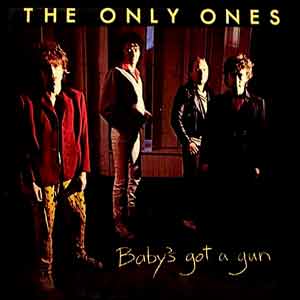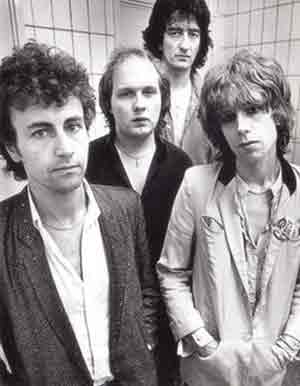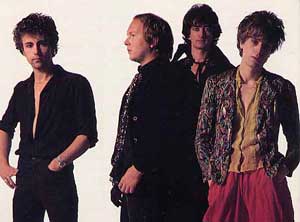
No.5 Baby's Got A Gun
The Only Ones (1980)
For an overview of Peter Perrett’s career up to forming the Only Ones and securing a contract with CBS records in 1978, please refer to my review of their debut LP on this site.
After the release of the second album, Only Serpents Shine, the relationship between the Only Ones and CBS had degenerated badly and when studio time was booked for the next project the choice of producer was a sticky issue. Perrett and his bass player Alan Mair had produced Serpents, but despite cult success there was no sign of a bigger commercial breakthrough and subsequently the record company bridled at the thought of the group producing themselves on what was likely to be their final bite of the cherry before being dumped. The man selected for the job was Colin Thurston, engineer on David Bowie’s legendary Heroes and Iggy Pop's Lust for Life. His first work as a producer had been with Magazine on extraordinary Secondhand Daylight album issued the previous year.
The LP begins with Oh Lucinda (Love Becomes A Habit), a strong song musically with a play on the word ‘habit’, bearing in mind Perrett’s chemical tendencies. It has a somewhat contradictory first verse:
Take the crutch away from you
and watch you fall down
it’s a shame about a girl like you
always falling down
This is fine talk coming from a smack addict. But the melody is irresistible, with crystalline guitars, ghostly backup vocals and a tense arrangement. Peter then empathises with his subject:
The enemy we’re fighting
he’s inside of you and me
please stop crying
I know you used to smile before
I know it’s not impossible
So the track finishes optimistically, which is nice.
Booming drums kick off The Happy Pilgrim, a plea for protection in the face of an uncaring world. Mike Kellie’s performance is spot on, adding shakers to augment his percussion. John Perry plays a fine solo and Peter Perrett beseeches:
Take me into your heart
keep me safe from evil
take me into your heart
I’ve had enough of tragic people
Has there ever been a colder, more cynical song title than Why Don’t You Kill Yourself? Probably tons, hardcore death-metal numbers called I Will Eat Your Knee, etc. But I wonder how they would compare musically with this superb slice of rock n’ vitriol. A seedy guitar riff sashays alongside some excellent bass from Alan Mair before Perrett’s breathtaking question and kiss-off:
Why don't you kill yourself?
you ain't no use to no-one else
To make matters worse he then adds:
This ain't no missionary speech,
just some friendly advice
Me And My Shadow takes the title of an old, long forgotten music- hall song and puts it to this dark mangle of jungle percussion, soaring guitars and a vocal fraught with anxiety:
Something out there’s haunting me
Fills my life with mystery
Won’t let me rest in peace
Won’t give me no release
Like the bastard son of Street Fighting Man, this Bo Diddeley-fest is strewn with rattling, clicking devices which add to the tropical atmospherics. This is of course drummer Mike Kellie’s showpiece and he really excels, showing us the results of years of experience in the group business with a powerhouse performance. His tom-toms take one hell of a beating, a sexy female voice responds to Peter Perrett’s title phrase and those guitar overdubs growl nicely.
Deadly Nightshade is over too quickly: a snappy, poppy classic with a strong melody and charismatic singing. Lyrically, a string of clichés and puns on the titular weed, this is a perfect example of quality post-punk power pop.
Strange Mouth is a bit of a filler unfortunately. It isn’t a bad song, just not as special as everything else here and arrives and departs without leaving very much of an impression.
Bassist Alan Mair’s fantastic pop classic My Way Out Of Here follows, on which he provides the lead vocal. Mike Kellie’s rotating tom-tom beat drives the song along at a furious pace without sounding rushed, whilst Mair’s plaintive vocal is superb, bringing the pleading lyric vividly to life. For the middle eight, the pace drops into a dramatic time change and adopts a completely different melody, very catchy, very attractive, very poppy.
The Big Sleep is the album’s monster epic, a film noir extravaganza led by colossal stabs of John Perry’s guitar. A sly satire on the classic Sleeping Beauty model, Peter is kissed by one of his nocturnal sirens and wakes to discover genuine love, real love, literally. Prior to John Perry’s fantastic solo, Perrett croons his fears and expectations in a voice shrouded with reverb and as the guitar grooves, the pace picks up and flies off, only to return to its original speed with unnerving poise.
I don’t ever want to sleep again, Now that I’ve found love
Perrett maintains his misty-eyed romantic vision to the end.
Re-union is a danceable half-waltz with female harmonies chiming in on the chorus lines. Echoing handclaps on the off-beat give the odd impression of a square dance in a barn somewhere west of ol’ El Paso. This type of arrangement illustrates how, in the post-punk period, bands could finally experiment with genres and have the bottle to present such stylistic tangents with aplomb.
One of the singles from Baby’s Got A Gun was Fools, an ancient C & W standard covered here in a delightful duet between Peter Perrett and Pauline Murray, at the time the lead singer in Geordie punk rascals, Penetration. Their voices mingle surprisingly well in this unlikely foray into new waters for a new wave act. Fifty seconds in, the acoustic guitar is introduced, playing an almost madrigal type of fingerpicking technique, favoured by such English folk legends as John Renbourn and Bert Jansch. Fools was not a hit.
A baby’s voice making an indescribably strange sound (all right, I’ll have a go: it sounds a bit like a dolphin guffawing) opens the next track, Castle Built On Sand. With its jerky time signatures, echoing rhythm guitars and nursery-rhyme-like tune, this compelling piece entrances by courtesy of a provocative, mysterious lyric:
Standing at the trader’s gate masked men on horses wail
for their chance to infiltrate and take the castle built on sand.
What does it all mean? When everything else (the musical stuff, I mean) is as great as this, who gives a toss?
The other 45 from the LP, Trouble In The World, rounds up this splendid, final release from one of the most underrated groups of all time. The song blasts off with fizzing rock n’ roll guitars and Perrett’s whining voice listing many things that piss him off no end.
Relationships, eh? Described here as a ‘prison,’ our weary hero has nothing positive to say on this prickly subject. John Perry’s guitar morse codes into the horizon and the album is brought to an abrupt halt.
Sadly, Baby’s Got A Gun wasn’t a success and CBS records unceremoniously dropped them and they split up. But record companies, however wealthy, wouldn’t know a great record if it was rammed up their arse covered in chilli powder. If you’ve never encountered this group, why not search out all three of their wonderful albums?
Part 6 • The Zones • Under Influence
|
|
|
|


